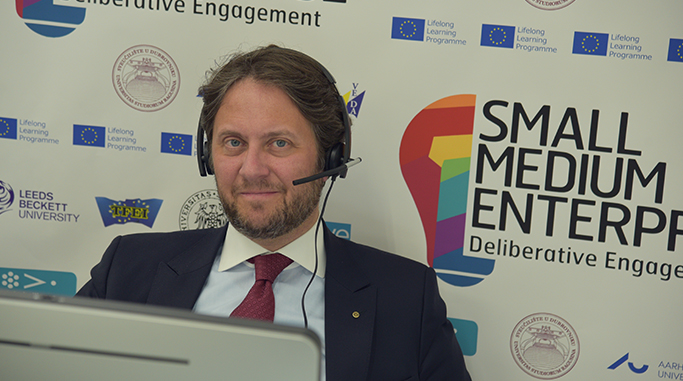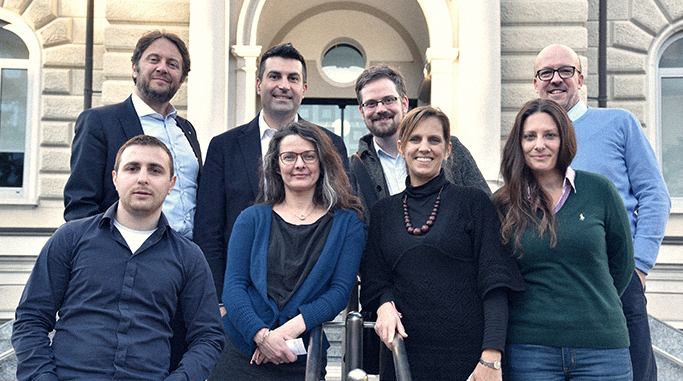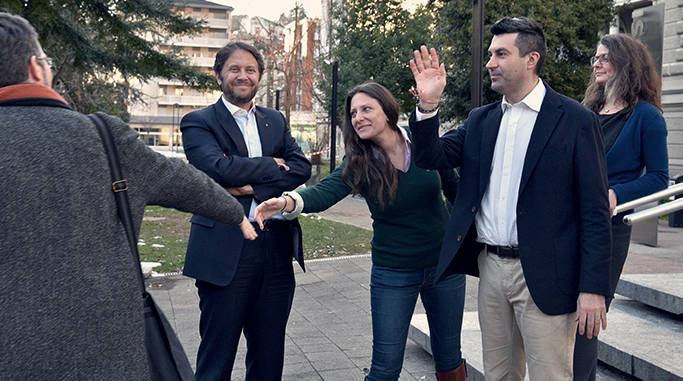Small Medium Enterprises - Deliberative Engagement
The Global Alliance has partnered with different European organizations, universities and enterprises on Small Medium Enterprises - deliberative Engagement (SME - DE).
The outcome of the project has been presented during the free webinar "How to engage stakeholders on challenging problems?" that took place on 9 march 2016. For information regarding the webinar, please click here.
9 march 2016 - panelists
Executive Summary
This project set out to answer a simple question: how can small and medium sized businesses in a number of settings (urban and rural, and in different locations in Europe) be actively engaged in addressing difficult, ‘wicked’ long-term business sustainability issues such as those associated with climate change? The thesis underlying the project had two key elements:
- That intermediary organisations (such as trade bodies, municipal authorities and sectoral organisations) have a key role to play in activating SMEs in this way, and
- Engaging SMEs in a highly participative way, where they work together to share and discuss ideas and come up with solutions to climate-related challenges (often referred to as a deliberative approach), is an effective way of enabling SMEs to address these challenges.
The project posited that communications and confidence-building measures, as well as contextual factors such as political and cultural contexts, were likely to be critical to the success of deliberative engagement involving SMEs and their intermediaries. The project was built around a number of case studies in different EU countries involving deliberative workshops with SMES and intermediaries.
We conclude that deliberative engagement, allied to a proper understanding of organisational and contextual factors, has the potential to facilitate collaborative problem-solving amongst SMEs and their intermediaries in addressing ‘wicked’ problems. This includes sustaining that collaboration through the development of on-going SME networks. Because of its creative and discursive nature, deliberative engagement allows people and organisations to explore issues holistically and create bottom-up solutions to difficult challenges. SMEs and their intermediaries are interested in engaging on business sustainability issues, given a well-designed process with the right focus.
The conditions for this potential to be realized are critical, and relate not only to the practicalities of a well-designed deliberative event, but also to the way in which intermediaries communicate and build confidence with their SMEs. Contextual factors are also key: the political, cultural, organisational and geographical contexts for intermediary and SME engagement will all affect the ease and extent to which deliberative engagement can be used effectively. Policy makers and others should not underestimate the challenge of engaging intermediaries and SMEs in this way. Deliberative engagement can be seen as risky, particularly in challenging political or regulatory contexts, and many intermediaries and SMEs will not be familiar with this approach. It requires firm commitment and leadership by intermediaries, as well as stimulus by ‘policy entrepreneurs’ and innovators within intermediary organisations.
We draw out practical learning from the case studies that will be used to inform executive training material for intermediary organisations and a simple guide to deliberative engagement. We also draw out some key implications for policy making within the EU.












































